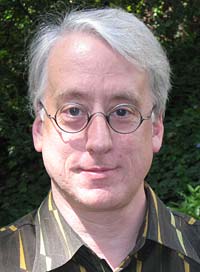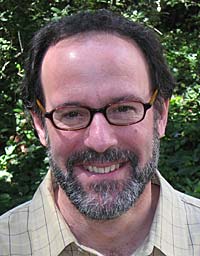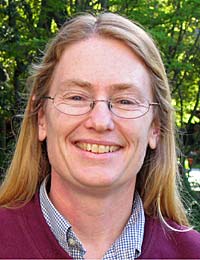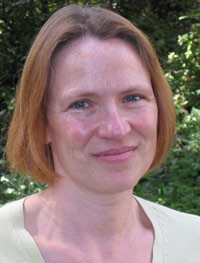UC Berkeley Press Release
Distinguished Teaching awards announced
BERKELEY – Three professors in the humanities and one in science have won the University of California, Berkeley's prestigious 2007 Distinguished Teaching Award. The award is bestowed by the Berkeley Division of the Academic Senate's Committee on Teaching, which is comprised of faculty members and students.
Since the award's inception in 1959, only five percent of campus faculty members have received this highest honor for instruction at UC Berkeley. This year's recipients bring the total to 223. As part of the rigorous screening process, committee members read at least two years' worth of student evaluations, which can number into the thousands, evaluate each candidate's teaching philosophy and course materials, and observe them as they teach.
A ceremony honoring Andrew Garrett, associate professor of linguistics (whose wife, Leslie Kurke, received the award in 2002); Steven Goldsmith, associate professor of English; Eileen Lacey, associative professor of integrative biology and Kathleen McCarthy, associate professor of classics and comparative literature, will be held tomorrow (Wednesday, April 25) at 5 p.m. at the campus's Zellerbach Playhouse. A video briefly profiling each of the recipients will be presented at the event, which is open to the public.
Also at the ceremony, the Educational Initiatives Award will be presented to the Biology 1B Field Section in the Department of Integrative Biology. The award is presented annually to a department or unit in recognition of distinctive contributions to undergraduate education.
Andrew Garrett
Department of Linguistics
 Andrew Garrett (Kim Steinbacher photos) |
Associate Professor Andrew Garrett comes from a family of teachers, including two of his grandparents, his father and several uncles and aunts. His brother is a Tibetan linguist, and his sister is a scholar of Tibetan religion; both teach. So, it's not surprising that Garrett says he never seriously considered any career but teaching.
Although he majored in folklore and mythology as an undergraduate at Harvard University, Garrett found his true calling while earning his Ph.D. in linguistics at Harvard. He came to UC Berkeley in 1995 with training in Indo-European languages, but after spending time in the linguistics department's Survey of California and Other Indian Languages archive, he switched his focus to endangered California Indian languages, such as Yurok, spoken in northwestern California.
A new resource in the effort to save the language is the online Yurok Language Project set up by Garrett to develop an easily accessible digital archive complete with a dictionary, sound recordings, geographical information, and Yurok songs and stories.
Garrett, who teaches classes in historical linguistics, Indo-European linguistics and American Indian linguistics, especially delights in teaching an upper division course that introduces students to linguistics science and reflects "the very broadest purpose of undergraduate linguistics education - opening a window on human diversity and fragility."
In addition to teaching on campus, Garrett also works with the Yurok Tribe, making a 600-mile round-trip North Coast trek drive regularly to conduct field work and offer grammar classes to Yurok teachers eager to teach younger tribal members to keep their language alive. Today, there are about a dozen fluent Yurok speakers, all of them elderly, trying to spread their language to youth in local elementary and high schools.
Five years ago, Garrett said, he was pessimistic that the Yurok language will survive. Now, he said, he's more hopeful because of increasing interest and efforts within the Yurok community, California's largest Indian tribe.
Garrett's UC Berkeley colleague, linguistics professor Leanne Hinton, praised Garrett as a "great learner as well as a great teacher."
Steven Goldsmith
Department of English
 Steven Goldsmith |
Steven Goldsmith, associate professor of English, says he views teaching as "thinking aloud together," whether in a small course or a large lecture class.
"If by 'thinking aloud' I can make the pleasure of careful, patient discovery accessible to my students," he says, "then they return that pleasure in the form of their own more rigorous and imaginative arguments, their own more probing questions, and their willingness to challenge limits I myself did not recognize."
Goldsmith's interest in literature came from hearing poetry read aloud by his University of Michigan professor and from discovering major English Romantic poets William Wordsworth and William Blake.
"I immediately took to one (Wordsworth) for loving lakes and mountains and the other (Blake) for boldly denying nature's importance," he says. "Most people grow out of their attachment to Romanticism; I didn't."
Goldsmith is popular at UC Berkeley for his courses on Blake and on the Bible as literature. He has developed a new class called "Why Do We Cry? The Literature of Sorrow, Sympathy and Indifference."
He says that literature classes are among the few places where "unaccountable knowledge can still happen" as students freely discuss sensitive and controversial issues, not hindered by the weighty responsibilities of policymakers or specialists.
Goldsmith's former student Edward Ballister recalled Goldsmith's "dazzling, captivating lectures." His "Bible as Literature" class, Ballister said, "integrated ancient history, the history of the text itself, the history of biblical translation and scholarship and even modern artistic interpretations of the Bible into a fascinating course of study."
Eileen Lacey
Department of Integrative Biology
 Eileen Lacey |
Graduates of Eileen Lacey's animal behavior class never look at nature films the same way again. Lacey uses film clips in her highly interactive classes to spur students to question what they see, and to maintain a critical eye when it comes to animal behavior, and human behavior.
"I want them to sit back and ask, 'Hey, do I believe that? Do I agree with that? Does that make sense?'" says Lacey, associate professor of integrative biology and curator of mammals at the campus's Museum of Vertebrate Zoology. "From the start of the class early in the semester they go from being relatively accepting and tolerant of everything I'm saying to questioning and challenging me on things."
Lacey, an internationally acclaimed scientist, came to UC Berkeley in 1996. Graduate student Samuel Diaz Munoz praises her lectures, which he says are "sprinkled with efficient use of multimedia, to get students motivated to observe and ask questions about animal behavior and to deliver concepts in a way that words sometimes cannot."
Also admirable is Lacey's participation in all lab courses and field trips, which is unusual for a professor and allows her to get to know her students better. "I learned that from Jim Patton (a professor emeritus of integrative biology and a 1991 recipient of the Distinguished Teaching Award). I saw what a difference it made that he was in the lab," she says.
Students laud her accessibility and the lively and fun dialogue she encourages in the classroom. Colleague Roy Caldwell, professor and chair of integrative biology, extolled her teaching style. "Because of her effective and personal style of lecturing, students quickly identify with Eileen," he says, adding, "She is a role model, particularly for women, as a professor and scientist."
"I'm doing this because I love what I do, working with animals and figuring out what they are doing," says Lacey, who studies social behavior in rodents and describes herself as a "hardcore, old-school field biologist." "To see that connect in someone else, to see the physical reaction, the change in facial expression, is probably the biggest reward for me."
Kathleen McCarthy
Department of Classics
Department of Comparative Literature
 Kathleen McCarthy |
"I think conversation is one of the great pleasures of life, and the reason I enjoy teaching is that it offers a specialized form of conversation," says Kathleen McCarthy, an associate professor in classics and comparative literature who specializes in the social and cultural analysis of Latin poetry.
Whether teaching the large, lower-division Introduction to Roman Civilization lecture course or much smaller, more intimate Latin classes, McCarthy relies on conversation to convey information and to stimulate discussion, inquiry and the sharing of ideas.
"We don't normally prepare for conversations," she wrote to the Distinguished Teaching Award Committee, "but in teaching, the conversation will quickly fall flat if the teacher hasn't figured out in advance both the relevant factual information and a strategy for communicating it."
Her strategy in the Roman Civilization lecture is to pose an open question, usually something requiring deductive ability rather than deep knowledge of the classics, so all students are on the same footing. She also breaks up the lecture into sections, and pauses for questions between the sections.
In smaller undergraduate classes such as Latin, McCarthy says she uses translation as a tool rather than "something they (students) have to struggle their way through as homework and are now reciting for my approval ...The real goal of the class is to read the Latin texts, not to translate them -- and to share our thoughts on the texts we're reading."
McCarthy, whose mother was an elementary school art teacher, became interested in literature and history as an undergraduate, but realized that the classics allowed her to pursue both fields. She once taught high school Latin, but decided to move to the university level because she wanted to be more deeply engaged in literature and to write.
Leslie Kurke, chair of UC Berkeley's Classics Department, commended McCarthy for her "range, creative imagination and ambition."
Educational Initiatives Award
The 2007 winner, the Biology 1B Field Section in the Department of Integrative Biology, gives undergraduates the opportunity to see how science really works through hands-on experience in field biology. For many students, these projects provide the most rigorous scientific experience of their undergraduate careers, and several turn into published papers.
Fall 2006 projects included The Role of Urbanization and Human Presence on the Social Behavior of the California Sea Lion; Human Disturbance and Biodiversity: A Study of the Macro-invertebrates of Strawberry Creek; Plankton Abundance in Relation to Water Chemistry in the San Francisco Bay; and Abiotic Factors Influencing Biodiversity across the Mid-intertidal Zone.

